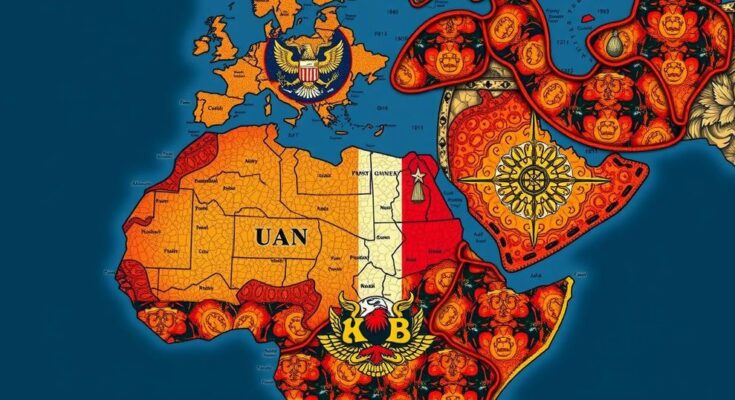Russia has deployed military instructors to Equatorial Guinea to bolster the regime of President Teodoro Obiang as part of its broader strategy to expand influence in West Africa, despite previous losses in the region. This assistive role comes as the U.S. reduces its engagement, with potential partnerships in the oil sector emerging. The situation reflects a significant shift in geopolitical dynamics in the area, raising concerns about Western strategic interests.
In recent weeks, Russia has dispatched between 100 to 200 military instructors to Equatorial Guinea, signaling an expansion of its influence in West Africa, particularly following its setbacks in Mali. These instructors are reportedly training elite forces in the country’s main cities, highlighting Russia’s strategic intent to deepen ties with the region amidst declining Western presence. Equatorial Guinea’s 82-year-old President Teodoro Obiang Nguema Mbasogo, who has been in power since 1979, seeks Russian support to safeguard his administration against potential threats. The Russian military deployment is part of a broader trend toward increased Russian activity in West and Central Africa, which has seen thousands of mercenaries engaging in various capacities to assist military governments thrust into conflict. This initiative not only serves Moscow’s geopolitical objectives but also offers financial gain through government contracts and opportunities in sectors such as mining and energy. President Obiang acknowledged this assistance during his September visit to Moscow, expressing gratitude towards Russian President Vladimir Putin for fortifying Equatorial Guinea’s military capabilities. Reports indicate that the Russian instructors are primarily concentrated in the capital Malabo and the mainland city of Bata. Job advertisements for security personnel surfaced on Russian Telegram channels, offering lucrative contracts for six-month terms, underscoring the mercenary aspect of Russia’s approach. There are indications that these personnel may belong to elite military units or established paramilitary groups such as the Kremlin-controlled Africa Corps. With Equatorial Guinea’s energy sector seeing a decline in investment from the United States, Russian interest has become more pronounced. Given the country’s diminished oil production, estimated at 80,000 barrels per day from a peak of over 300,000, the Russian engagement now focuses on potential partnerships in the oil and gas domains. The U.S. State Department has cautioned against dealings with Russian defense entities, emphasizing potential legal repercussions under U.S. law. As Equatorial Guinea grapples with internal pressures and historical coup attempts, Russian military support may bolster the current regime’s stability.
The geopolitical dynamics in West Africa are shifting, with Russia strategically expanding its military and economic influence in countries like Equatorial Guinea. The deployment of military instructors emerges amidst a backdrop of diminishing Western engagement, particularly as U.S. energy firms retract after years of substantial investment. This maneuver by Russia exemplifies a broader tactic of leveraging military presence for economic advantages, aligning with similar initiatives observed in other African nations experiencing conflicts. The precarious regime of President Obiang further necessitates reliance on foreign military support to maintain power and quell dissent.
Russia’s military engagement in Equatorial Guinea illustrates a deliberate strategy to establish a foothold in West Africa, driven by both defense needs of the local regime and the Kremlin’s desire to counter Western influence. As U.S. interest wanes, the backdrop of potential new partnerships in the oil and gas sector presents an opportunity for Russia to assert its economic interests in the region. This development not only underscores the shifting balance of power in Africa but also the implications for Western diplomatic and economic stakes in the area.
Original Source: www.usnews.com




